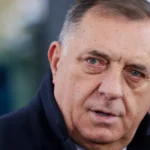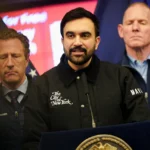German policy follows with concern the partly violent protests that took place over the weekend in several German cities against the Corona measures and vaccination. How serious is the risk of radicalization?
Protests against Corona measures and vaccination took place across Germany over the weekend. Not all protests were peaceful, and not all were allowed. Experts and politicians warn of a risk of radicalization.
Terrorism researcher Peter Neumann, who follows with concern the developments of the protests against the restrictive measures and vaccination and sees there a potential danger for their radicalization. In an interview with Bild TV, Neumann said on Sunday that “what we see in isolation are complex attacks on the RKI (Robert Koch Institute) for example, on clinics or vaccination centers.” For this reason he sees it possible, “that in the coming months we will really have to talk about terrorist campaigns.” According to Neumann topics like the obligation to vaccinate or vaccinate children will lead to further radicalization. “These are two strong emotional themes, since this scene will be valued as a signal and can serve as a trigger for extreme actions.” Researcher Neumann thinks,
“Danger to democracy”
Concerned reactions also come from politics and rumors of a determined state action have grown. The president of the Bundestag, Bärber Bas, (SPD) notes a “significant” radicalization of the protests. “This is really a threat to democracy,” the Social Democrat politician said on a German television show, ZDF. She demanded a ban on demonstrations in front of the homes of politicians and politicians as well as stronger surveillance of Telegram chat groups. Many opponents of Corona gather on this social network.
Meanwhile, the deputy chairman of the CDU / CSU Union parliamentary group, Thorsten Frei (CDU), demanded the criminal and consistent prosecution of attempts to intimidate the state or violations of the law on gatherings. “In this situation the state should in no way come out as weak,” Frei told the German newspaper Welt. Feedback also comes from the Greens. Green politician Konstantin von Notz called the current development “more than threatening”, saying such groups should not be reduced to harmless. The deputy leader of the liberal parliamentary group, Konstantin Kuhle, warned against the deliberate infiltration of peaceful protests. The Prime Minister of the state of Mecklenburg-Pomerania, Manuela Schwesig, stated that “many pursue goals other than Corona,
Protests in several cities
Protests took place in several German cities against measures taken to mitigate the fourth wave of the pandemic in Germany. In Grajc, Thuringia 14 police officers were injured in protest. Police in riot gear stormed a rally on Saturday, removing hundreds of protesters by truck. Protesters tried to break the police cordon.
In the sequences recorded and published on twitter, the protesters were seen catching up with the police to break the blockade. A photographer of the German news agency, DPA reported on an aggressive atmosphere. Police initiated 44 criminal proceedings. Police in riot gear stormed a rally on Friday, removing some 1,500 protesters by truck under the slogan “For freedom, truth and self-determination.” Calls for wearing the mask were ignored. About 100 people took part in an unsanctioned protest in Frankfurt, and police dispersed the protest.
There have been protests in other countries against Corona’s measures. In Barcelona, 3,000 people took part in a rally against the government’s measures. Demonstrators in Catalonia protested against the decision to forcefully show proof of vaccination before entering discos, restaurants or gyms. In Austria the protests were more massive. According to police data about 15,000 people gathered in the center of Vienna. The head of the FPÖ, Herbert Kickl called for resistance against the vaccination obligation planned in February.








